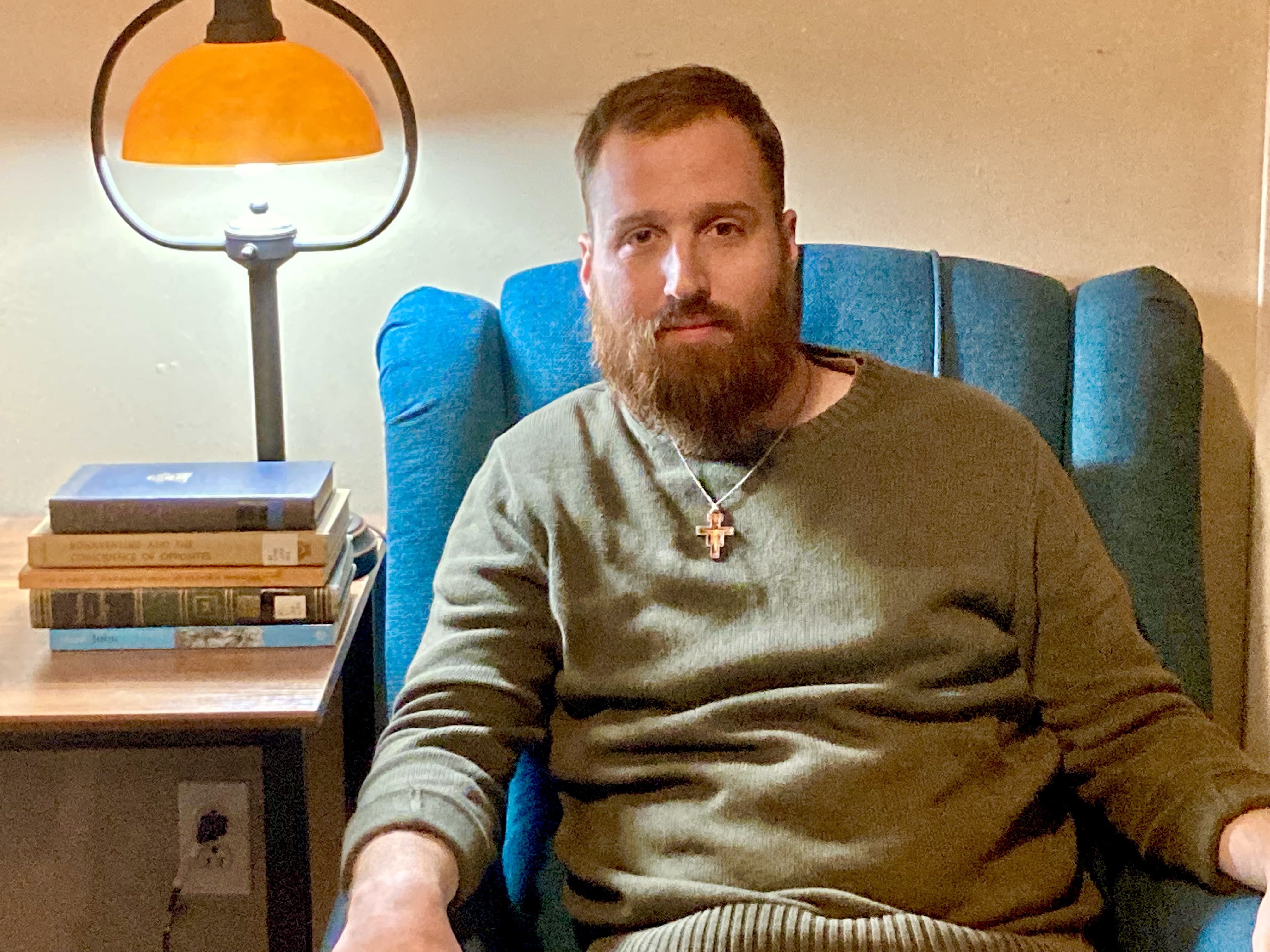Lance Gracy is a Teaching Fellow and Ph.D. student in Philosophy at the University of North Texas in the Department of Philosophy and Religion. His research centers mainly on metaphysics and religion and how, together, they can remedy or (re)solve contemporary environmental issues. He and his wife Elizabeth have four children: Alice, Daniel, Edith, and Francis.
What excites you about philosophy?
Several years ago, a good friend and an even greater professor told me that philosophers are like special forces operators: they go behind “enemy lines” and do the covert work needed for others to complete their mission. This has always stayed with me. To me, philosophy is about working things out at the highest levels of abstraction. This “abstract operation” is deeply rewarding and life-enriching. It points to the purpose of philosophy—one of securing, at the outset of an individual’s life-long mission of fulfillment, a mind set on learning. Through a mind set on learning, one comes to lay to heart wisdom and knowledge. To know that I am responsible for setting the conditions that allow people to lay to heart wisdom and knowledge and complete their mission in life—this is what I find exciting about philosophy.
What are you working on right now?
Lately I’ve been working on the role metaphysics and religion can play in addressing environmental problems. I’m particularly interested in the metaphysics of St. Bonaventure. According to Maimonides, a mastery of metaphysics implies a degree of perfection, and there is in Bonaventure’s thought an art of “true metaphysics.” By elucidating what it means to possess metaphysical mastery through the art of “true metaphysics,” one thing I aim to show is the relevance of metaphysics and religion for (re)solving contemporary environmental issues.
What are you reading right now? Would you recommend it?
I’m currently reading Analogia Entis: Metaphysics—Original Structure and Universal Rhythm by the Jesuit philosopher and theologian, Erich Pryzwara. I’m also reading St. Bonaventure’s Collations in Hexaëmeron.
I highly recommend both.
Which books have changed your life? In what ways?
I couldn’t count the number of books that have positively changed my life. I think books change us according to where we are in life; yet not all of them are created equal, and a book that changes our life at one moment may not have the same impact on us at another moment in life. For me, there are two books that stand due to their impact on me at a uniquely impressionable time in my life. They are: The Consolation of Philosophy by Boethius and Les Misérables by Victor Hugo. The former positively changed my life by instilling a desire to live fully in accordance with wisdom, sort of like what Cicero’s Hortensius did for Augustine. Like King Solomon, I was inspired to choose wisdom before all else, and I have been rewarded for it. In reading Hugo’s Les Misérables, my imagination was elevated, and I saw there a profound harmony between philosophy and literary masterpieces, which I continue to rely on to this day. Books are wonderful, aren’t they?
What would your childhood self say if someone told you that you would grow up to be a philosopher?
Interesting! If someone had told me I would grow up to be a philosopher, I doubt I would have possessed the seriousness of mind to know exactly what that meant, let alone to ask: “And what is philosophy?” But if I knew then what I know now, I probably would have been elated!
I felt an affinity for philosophy at a young age. As a child, I would often seek refuge in my interior life but had very few people to draw out what it meant philosophically. On one occasion, during a fifth- or sixth-grade project on the Holocaust, I asked my teacher: “Why didn’t the Jews hide their identity? Why didn’t they just refuse to stitch a Star of David on their clothes?” To this, my teacher asked: “Lance, are you a baseball player?” Unhesitatingly, I replied with “Yes” and my teacher responded: “See? It’s not so easy to hide your identity, is it?” This experience was certainly a step in the direction of philosophy. In high school, at the age of seventeen, I searched for something “philosophical” to sink my teeth into, so I turned to Rousseau’s Émile. Regretfully, my dabbling in philosophy at this age only served to puff me up with pride and arrogance. (Was that Rousseau’s fault, my own, the fault of others, or a bit of all three?) I had teachers, coaches, and others who inspired discipline in me, but it was never quite the discipline of reason needed for training in philosophy.
I recall seeing a poster for graduate study in philosophy when I attended college for a year prior to joining the military. This was back in 2010. I distinctly remember telling myself: Someday, I’ll go to graduate school in philosophy. Little did I know it would take the rough physical discipline of the Marine Corps infantry to get me there!
What’s your favorite quote?
“For all creatures are essentially a certain image and likeness of the Eternal Wisdom…”
- St. Bonaventure, Itinerarium Mentis in Deum, II.12
This section of the APA Blog is designed to get to know our fellow philosophers a little better. We’re including profiles of APA members that spotlight what captures their interest not only inside the office, but also outside of it. We’d love for you to be a part of it, so please contact us via the interview nomination form here to nominate yourself or a friend.
Dr. Sabrina D. MisirHiralall is an editor at the Blog of the APA who currently teaches philosophy, religion, and education courses solely online for Montclair State University, Three Rivers Community College, and St. John’s University.
